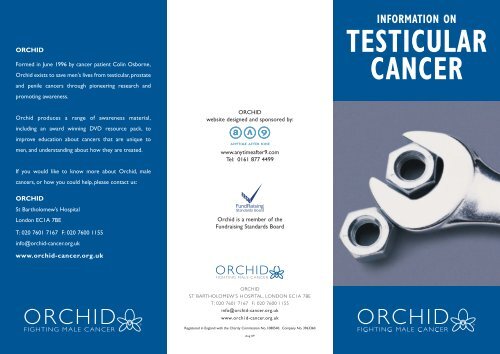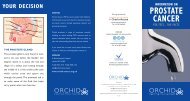testicular cancer information - Orchid
testicular cancer information - Orchid
testicular cancer information - Orchid
Create successful ePaper yourself
Turn your PDF publications into a flip-book with our unique Google optimized e-Paper software.
ORCHID<br />
Formed in June 1996 by <strong>cancer</strong> patient Colin Osborne,<br />
<strong>Orchid</strong> exists to save men's lives from <strong>testicular</strong>, prostate<br />
INFORMATION ON<br />
TESTICULAR<br />
CANCER<br />
and penile <strong>cancer</strong>s through pioneering research and<br />
promoting awareness.<br />
<strong>Orchid</strong> produces a range of awareness material,<br />
including an award winning DVD resource pack, to<br />
ORCHID<br />
website designed and sponsored by:<br />
improve education about <strong>cancer</strong>s that are unique to<br />
men, and understanding about how they are treated.<br />
www.anytimeafter9.com<br />
Tel: 0161 877 4499<br />
If you would like to know more about <strong>Orchid</strong>, male<br />
<strong>cancer</strong>s, or how you could help, please contact us:<br />
ORCHID<br />
St Bartholomew’s Hospital<br />
London EC1A 7BE<br />
T: 020 7601 7167 F: 020 7600 1155<br />
<strong>Orchid</strong> is a member of the<br />
Fundraising Standards Board<br />
info@orchid-<strong>cancer</strong>.org.uk<br />
www.orchid-<strong>cancer</strong>.org.uk<br />
ORCHID<br />
ST BARTHOLOMEW’S H OSPITAL, LONDON EC1A 7BE<br />
T: 020 7601 7167 F: 020 7600 1155<br />
info@orchid-<strong>cancer</strong>.org.uk<br />
www.orchi d-<strong>cancer</strong>.org.uk<br />
Registered in England with the Charity Commission No. 1080540. Company No. 3963360<br />
Aug 09
TESTICULAR C ANCER INFORMATION<br />
THE PROBLEM<br />
Testicular <strong>cancer</strong>, though the most common <strong>cancer</strong> in<br />
younger men aged between 15 and 45 is relatively rare<br />
compared to <strong>cancer</strong>s such as lung or breast <strong>cancer</strong>, with<br />
nearly 2,000 cases per year, but the rate is increasing. The<br />
most common way these <strong>cancer</strong>s are identified is by finding<br />
a lump in the testicle. Therefore men in this age group<br />
should be encouraged to examine their testicles for lumps<br />
on a regular basis. Surveys suggest that many men are<br />
unaware of <strong>testicular</strong> <strong>cancer</strong>, or prefer to ignore it, and that<br />
few people check their testicles.<br />
In over 25% of cases the <strong>cancer</strong> has already spread by the<br />
time of diagnosis. Despite this, today more than 95% of<br />
patients are cured with chemotherapy. If caught at an early<br />
stage, the treatment is much simpler and may only require<br />
surgery to the diseased testicle, the probability of a<br />
successful cure is more than 98%.<br />
As well as giving you facts about the risks related to<br />
<strong>testicular</strong> <strong>cancer</strong> and what you can do it reduce them the<br />
aim of this leaflet is to make men aware of what is normal<br />
at an early age, so that they can react quickly if they do<br />
detect signs of change.<br />
Bladder<br />
Pubic Bone<br />
Prostate<br />
Urethra<br />
Penis<br />
Epididymis<br />
Seminal<br />
vesicle<br />
Vas deferens<br />
Scrotum<br />
Spine<br />
Lymph<br />
nodes<br />
CAUSES AND PREVENTION<br />
Unlike many <strong>cancer</strong>s there are few known strong risk<br />
factors for <strong>testicular</strong> <strong>cancer</strong> and we cannot currently predict<br />
who is likely to get the disease (unlike the link between lung<br />
<strong>cancer</strong> and smoking). While most of these <strong>cancer</strong>s occur in<br />
unsuspecting individuals, some risk factors can be traced in<br />
a minority of cases.<br />
These include:<br />
• testicle failing to get into the scrotum<br />
• a brother/father with <strong>testicular</strong> <strong>cancer</strong><br />
• a sedentary life style increases the risk but regular<br />
exercise reduces risk<br />
• mumps or repeated trauma (rather than inevitable<br />
knocks) increases risk<br />
WHAT TO LOOK OUT FOR<br />
Though occasionally patients may be diagnosed because<br />
they become generally unwell (e.g. with night sweats, loss of<br />
appetite and weight loss or persistent backache) due to<br />
tumour spread outside the testicle, or develop tenderness<br />
in the breast, most <strong>testicular</strong> <strong>cancer</strong> is diagnosed because of<br />
a lump or swelling in the testicle.<br />
From the time of puberty onwards, it is important that all<br />
men are aware of what is normal for themselves (there are<br />
slight differences in everybody). It is noticing changes such as<br />
areas of hardening or swelling in a testis that indicate a need<br />
to do something.<br />
Cradle the scrotum in the palm of both hands and use the<br />
thumb and fingers to gently squeeze the testicle, one at a<br />
time. Learn to differentiate between the main body and the<br />
epididymis collecting tubes (see diagram). Lumps in the<br />
collecting tubes are more common and benign. Lumps in<br />
the body are rarer but more important and need to be<br />
acted on quickly.<br />
One testicle may hang lower than the other and be different<br />
in size and even have areas of discomfort without having<br />
<strong>testicular</strong> <strong>cancer</strong>.<br />
The critical issue is looking for changes in consistency and<br />
areas of hardening and swelling, which are usually painless.<br />
WHAT TO DO IF YOU ARE WORRIED<br />
If you do notice any changes, particularly hardening or<br />
heaviness, you should not allow your natural embarrassment<br />
to delay discussing this with your doctor as soon as possible.<br />
Remember, your GP is there to help you.<br />
As most lumps are benign most patients with <strong>testicular</strong><br />
discomfort don’t have <strong>cancer</strong>. However, if your doctor is<br />
worried he may arrange for you to see a surgeon or<br />
organise an ultrasound or blood tests first.<br />
If the tests suggest <strong>cancer</strong>, the affected testicle is usually<br />
removed surgically.<br />
LIFE AFTER CANCER DIAGNOSIS<br />
Treatment for <strong>testicular</strong> <strong>cancer</strong> should not normally affect<br />
your sex life or your fertility. However, as treatment can<br />
sometimes be more complicated than is first envisaged,<br />
everyone who has not had their desired family is advised to<br />
have a sperm check and store sperm until treatment is<br />
complete and recovery of sperm has been proven.













